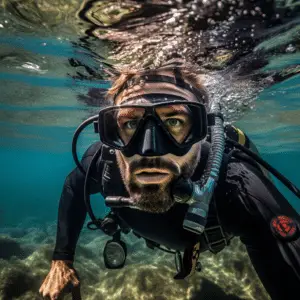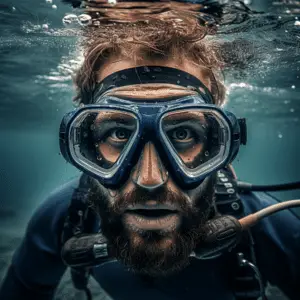YScuba Diving with Glasses, Scuba diving is one of the most exciting sports on the planet for a number of reasons. The first big reason is that it gives you a sense of freedom that you don’t get from other sports experiences, after all, who is more amazing than the feeling of floating in beautiful blue water? Secondly, scuba diving allows you to see sights that are impossible to experience above the water. Yes, aquariums exist, but they are only a microcosm of what amazing landscapes exist under the water. Being able to see the hidden wonders of the water is an amazing privilege, but what if your eyesight isn’t up to the task?
Unfortunately, we are a generation of humans that are completely glued to our computer or phone screens, which means that a lot of us have fallen victim to a lot of eye damage. More people are wearing glasses and contacts more than ever before, which may be a problem in the world of diving. After all, what’s the point in spending so much time searching for the best dive watches for less than $1500 if you can’t even see the screen?
If you are someone that is eager to try out scuba diving but you are also visually impaired, you may be wondering if you can scuba dive with your glasses or whether or not you’ll have to experience another world in 360p. Well, worry not as we have the answers for you?
Can you wear glasses?

One of the main bits of equipment you will use during your scuba diving experience is a mask. Now, you can either use a half-face mask or a full face mask, depending on preference. Though both masks look different, they fit the face in pretty much the same way and depend on certain points of your face to be free in order to fit properly. If they don’t fit properly, water will leak into your mask and make the mask’s job completely redundant. ou are wearing a full face mask, this can also be extremely dangerous as it could affect the way in which you receive all of that lovely oxygen that keeps you alive when you are underwater.
If you are a glasses wearer, you may be sad to know that your mask’s key resting points that I was referring to are also key resting points for your glasses. Your mask needs to fit snugly to your nose, like your glasses. It also needs to be able to fit around your ears, like your glasses. There are some masks for glasses made especially to will help you to go scuba diving with glasses.
Eyesight
If your eyesight is bad but not impaired, go into the water and try to cope without glasses. Water might help you notice details without glasses. Underwater, everything is exaggerated. If you merely have acute visual impairments, you should be safe and able to see the monsters under the surface.
Without glasses, someone with poor eyesight or partial blindness will struggle. Even if you don’t care about seeing the ocean’s wonderful features in great quality, not being able to see is dangerous. significantly with perfect eyesight, the water can be dangerous, but if you can’t see, you’re significantly more at risk, especially from strange objects and predators like sharks. Many scuba diving businesses won’t let you in if you can’t see. Before considering PADI vs. NAUI certificates, you need a way to see underwater.
Are there ways to see without glasses?

Though you may believe all is lost, there are actually a couple of alternatives for glasses that can be extremely useful for anyone wanting to pursue scuba diving as a sport. However, you can expect to spend a bit of money in order to find a good solution.
Diving glasses
Under any face mask, special diving glasses fit. These glasses guarantee your mask fits properly and prevent leaks. Your prescription can be filled with custom lenses. Diving glasses are pricey. Divers with bad eyesight are a niche market, therefore few places make glasses for them. If you love diving, it’s worth the investment. The glasses will last a long time, so it’s likely to be a one-time expenditure.
Contacts
Contact lenses are a great option for someone who wants to scuba dive and has poor eyesight. Contact lenses are often readily available at post opticians and won’t cost you too much. Unless you are someone who scuba dives almost daily, then you won’t need to buy many pairs, which your bank account will be super thankful for.
There are risks to using contact lenses in the water. Avoid getting your contact lenses wet since seawater has many naturally occurring microorganisms that could cause an infection. Contact lenses also fall out readily, which is not ideal for scuba diving. Thus, you should wear your mask the entire time you’re in the water to avoid knocking your glasses.
